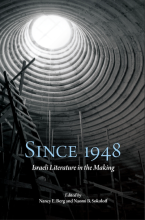The Near Eastern Languages and Civilization Department would like to celebrate Professor Naomi Sokoloff, Director of Modern Hebrew and Israel Studies Program, for her forthcoming work, Since 1948: Israeli Literature in the Making. Professor Sokoloff co-edited the book with Professor Nancy Berg from Washington University in St. Louis. The book explores the development of trends in Israeli literature, including works in Hebrew, Arabic, and Yiddish, across literary genres, and Israelis both in Israel and abroad. The emerging trends reveal the transnational, multilingual, and rich nature of modern Israeli literature.
Professors Sokoloff and Berg organized a conference at Washington University in Missouri in 2018 called "Israeli Literature @70". For the conference, Professor Sokoloff gave a presentation that also appears as an essay in the new book. Her essay, called "'The pigs were my friends': Animals in the Holocaust in Alona Frankel's Memoirs". When speaking about this work, Professor Sokoloff says, "My discussion points to several recent developments in Israeli literature and culture: a surge of autobiographical writing, renewed focus on the Holocaust since the 1990s, and an increasing interest in animal studies. I look at those issues in connection with an author who is best known for writing children's books, but who later in life turned to memoir to recount experiences from her own childhood."
Since 1948 will be released in October 2020 by SUNY Press. Professor Sokoloff's new work fits into a long career studying Israeli and Hebrew literature. Professor Sokoloff says, "Hebrew has undergone a remarkable revitalization as a modern, spoken language. One hundred years ago, a few tens of thousands of people spoke Hebrew. Today, the numbers are on the order of 14 million. During the past century, Hebrew literature and culture have evolved rapidly, in startling, inventive, sometimes brilliant, and sometimes troubling ways. I feel fortunate to have been engaged in an extraordinary field of study, watching these phenomena unfold. Hebrew is not my native language; I became fascinated with it when I was a college student and started taking formal classes only when I was in graduate school. At the time, I figured it would be challenging to pursue work in Hebrew, but that I would never get bored. I never have."
